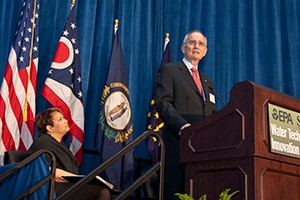
UC a Lead Partner in New Water Technology Innovation Cluster
UC is a leading partner in a new Water Technology Innovation Cluster announced Jan. 18 by EPA head Lisa P. Jackson, Small Business Administration head Karen Mills and UC President Gregory H. Williams. The purpose of the cluster is to develop and commercialize innovative technologies to solve problems related to water safety and use, safeguard public health and to create jobs.
With nearly 40 percent of the worlds population lacking access to basic sanitation and to clear running water and water consumption expected to double every 20 years, the cluster focuses on a pressing challenge for our planet.
Jackson and President Williams signed a memorandum of understanding (MOU) that strengthens the long-time partnership that the EPA and UC have fostered. We hope that the MOU that UC and the EPA sign today will be the first of many and a model for others to follow, the president said.
Both Jackson and Mills emphasized that the vision is for the cluster to enable the Ohio, Indiana and Kentucky region to become recognized as a national and world leader in the area of water technology innovation and commercialization

Image of EPA Administrator Lisa Jackson and President Williams with the new memorandum of understanding
President Williams welcomed the cluster as an example of the kind of innovative collaboration that is needed in a global and rapidly changing economy. He thanked UC Foundation board members
Jeffrey Williams and Jerry Leamon
for the key roles they played in making the cluster possible. He also cited the cluster as an example of the kind of collaboration that the universitys strategic plan, UC2019, is fostering.
With one of the top-ranked environmental engineering programs in the nation and $29 million in water-related research funding received in the last 10 years, UC is a leader in the area of water quality research. Recent UC projects have included partnering with the EPA and the local sanitation district to improve the city's combined sewer overflow, evaluating the security of water systems against the threat of terrorism and conducting the first controlled oil spill with the EPA to gain an understanding of the dispersants that were used in the Deepwater Horizon disaster.
The water cluster involves government, higher education and business. Jackson indicated that the federal government is initially committing $11.5 million in funding over three to five years to the cluster to form a national innovation center for drinking water and to support and implement the cluster and its work. Of that, up to $1.5 million will support private development in water technology innovation, through the Small Business Innovation Research Program (SBIR).
The regional technology cluster joins together more than 80 stakeholders and is led by a steering committee that includes UC, GE Power and Water, Greater Cincinnati Water Works, Northern Kentucky Sanitation, and many others. It links firms, businesses, suppliers, and supporting institutions such as local government, chambers of commerce, universities, investors and others to work together in an organized manner to promote economic growth and technology innovation.
The WTICs primary focus areas are:
- Green infrastracture;
- Monitoring and sensors;
- Treatment of multi-contaminants in drinking water.
Protecting Americas waters is one of the EPAs top priorities, and we have called for innovative strategies and technology to meet our nations 21st century water needs, said Jackson. This cluster will benefit from the regions abundance of cutting-edge companies. Investments made here will encourage continued growth, while positioning our nation to lead the way in a new market of environmental technologies.
President Williams noted that in addition to being essential to life itself, water is a key component in nearly every product made in our society today.
The MOU between UC and the EPA commits the two partners to working together to:
- Conduct joint research and collaborate on innovative technology development;
- Encourage undergraduate and graduate students to explore courses of study in the environmental sciences with an emphasis on water;
- Invest expertise to inspire and motivate students to develop innovative and advanced water technology solutions;
- And identify innovative approaches and practices to advance inventive and progressive water technologies potentially for a broad marketplace.
UC Vice President for Research Sandra Degen will serve on the clusters steering committee.
In addition to the announcement and signing of the MOU held Tuesday, UCs Center for Sustainable Urban Environments sponsored a
seminar featuring Dr. Paul Anastas
, known as the father of green chemisty and the U.S. EPA Assistant Administrator of Research and Development at EPA headquarters in Washington D.C.
Related Stories
Critics fear public-records proposal could make Ohio police...
April 25, 2025
UC Law Professor Mark Godsey discusses a proposed Ohio state budget bill that includes language that could limit the public’s access to law enforcement records due to a range of new exemptions for public records requests. Godsey is director of the Ohio Innocence Project.
Album by CCM faculty featured in the New York Times
April 25, 2025
Four CCM faculty members were recently highlighted in a New York Times roundup of notable new classical music albums. Entitled "5 Classical Music Albums You Can Listen to Right Now," the article spotlights the new album of Beethoven's string quartets performed by the Ariel Quartet, which has served as CCM's string quartet-in-residence since 2012. The ensemble is comprised of four CCM faculty members: Alexandra “Sasha” Kazovsky, violin; Amit Even-Tov, cello; Gershon Gerchikov, violin; and Jan Grüning, viola.
University of Cincinnati professor weighs in on Butler County’s...
April 25, 2025
The University of Cincinnati’s Michael Jones was featured in a Journal-News article that details Butler County’s potential hiring freeze and how the county has been managing its budget since the pandemic. The report, also featured on Cincinnati’s WCPO, explained why County Commissioner Don Dixon finds the current economic conditions “terrifying” and warranting major cost-cutting measures.
